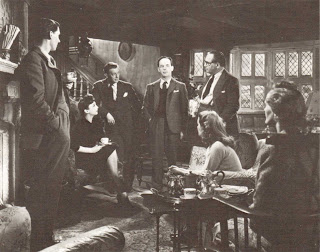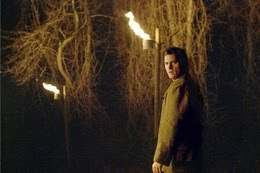Walter Craig (Mervyn Johns) is invited for the weekend to the country farmhouse of Eliot Foley (Roland Culver). But as he drives along to the farm, something odd disturbs Craig as he drives up and stops his car, something strangely familiar about the place, as if from a dream, which he finds himself gradually recollecting.

As he steps in, there's something oddly familiar about the other guests too: not only that, but they've also had their own dealings with the supernatural: racing driver Hugh Grainger (Anthony Baird) who has seen a creepy hearse driver (Miles Malleson) who turns up again on a bus that is about to crash. There's also Mrs Joan Courtland (Googie Withers) whose blissful married life is suddenly threatened by a sinister mirror which drives her husband (Ralph Michael) to murder. Eve
 n sceptics like Foley himself (who tells the one humorous segment of "Ealing comedy" involving Basil Radford and Naunton Wayne), young Sally O'Hara (Sally Ann Howes), and most notably, the pragmatic Dr. Van Straaten (Frederick Valk), all have their strange tales to tell.
n sceptics like Foley himself (who tells the one humorous segment of "Ealing comedy" involving Basil Radford and Naunton Wayne), young Sally O'Hara (Sally Ann Howes), and most notably, the pragmatic Dr. Van Straaten (Frederick Valk), all have their strange tales to tell.Thus began, in its now well-trodden form, the multi-ghost story compendium, which seems to suit horror and in particular British horror very well, where few of them are particularly long (or have any need to be), so Dead of Night is the ideal transposition of these chilling tales, and though Ealing were rightly famous for their comedies, they could turn their hands to other genres with equal skill, as this compelling film very ably demonstrates. Indeed if anything, there is a vein of wry conversational humour to the linking sequences in the farmhouse that helps to emphasize the horror even more.

Van Straaten's tale is the most remembered of the lot, and also the most imitated; it's perhaps not so terrifying, indeed even comical nowadays, to see a ventroliquist's dummy take over its owner. However, Michael Redgrave's demented Maxwell Frere (with his dummy, "Hugo") is a case of the film's main star in a relatively brief but startling role, and one that certainly grabs the most attention.

The nightmare reaches its zenith for Walter Craig, as Hugo strangles him.
But even more chilling for me however is the climactic linking sequence, where the whole stately set-up suddenly spirals into nightmare, and allows Basil Dearden (chief of the film's four fine directors) and Ealing to be experimental and highly avant garde.
Many film makers have mimicked this style of portmanteau horror, but the wrap-arounds are often tame and perfunctory, and none of them have Dead of Night's force - which makes itself felt even on the end credits, where...
...Walter Craig is invited for the weekend to the country farmhouse of Eliot Foley, but as he drives along to the farm, something odd disturbs Craig as he drives up and stops his car, something strangely familiar about the place.....




